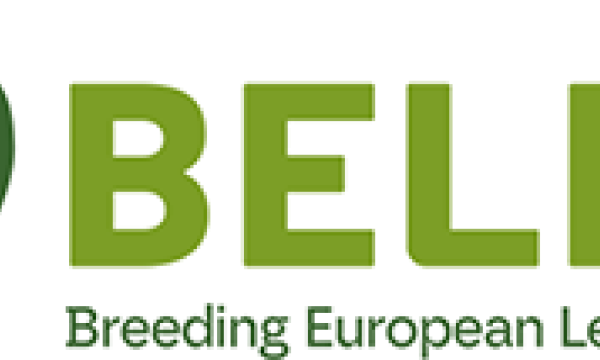Press release Demand for local pea for human food rising. Cultivation challenges remain.
Cultivation-related risks in dry-harvested yellow pea are still present, even after recent research. This is evident from an interim evaluation of PEAPACT and LEG-O. Through field research and collaboration with farmers, both research projects are aiming for optimizations, and even scaling up local production already.
Joos Latré, agricultural researcher at HOGENT: "There are many good reasons to get this crop more widely in our rotations. At the same time, we have to note that the yield -and harvest security of yellow pea is not yet as stable as that of wheat or corn. It varies from 8 tons/ha to almost zero.'
Inge Speeckaert of ILVO/Ugent: 'The innovative concept of strip cropping is perhaps going to ensure that the total yield/ha increases and also that the disease susceptibility of this crop decreases. Peas - and legumes in general - possess clear nutritional, environmental and soil-improving assets.' In the VLAIO project LEG-O, Speeckaert is looking at the extent to which alternating arable strips with legumes (pea, field bean, kidney bean) and with grain (baking wheat, durum, malting barley) lead to more stable yields.
On July 31, 2024, ten research and private 'pea' partners will share their experiences and observations, during a harvest event on 12 ha of field yellow pea in Linter. Arable farmers and journalists are welcome.
Ambition for rollout and scale-up of yellow pea in Flanders, a challenge
Compared to soy and lupins, for example, the cultivation of yellow pea as a legume has been known in Flanders for a longer time. Currently, legumes are only grown to a limited extent in Flanders, and then often as animal feed. Recently, a new dynamic is emerging. In the context of the protein shift, there is an increasing interest in locally grown legumes for human consumption from the retail and processing industries. ARVESTA, as a local processor, has recently invested in a new plant in Mettet, but the Walloon company COSUCRA is also pushing for more locally sourced peas. Hence the concrete increasing demand for interested farmers to provide more locally grown yellow pea. For ARVESTA, some 100 hectares of peas have been planted this season.
It is already known that field legumes are interesting in crop rotation because they can fix nitrogen from the air and thus do not need nitrogen fertilization. And that they leave residual nitrogen in the soil for the succeeding crop. In terms of cultivation, further areas of concern have been identified: Summer peas do better than winter peas. Winter peas often suffer from too much moisture and plant fungal disease (Anthracosis). Summer peas (sown from March-April), on the other hand, cannot quite make the combination of both a high yield and a high protein content. The latter is just important for interested factories doing protein extraction.
A supply chain story
Joos Latré: "If we want to convince arable farmers en masse to embrace local protein crops in their rotation, it is important to be able to present higher yield stability under extreme weather conditions. Many farmers prefer stability. Yield predictability is also related to final merit. The contract cultivation prices given for e.g. dry peas from France are considered (too) modest here for the time being.'
There are still a number of bottlenecks in the chain, including post-harvest processing such as drying, cleaning, optimal storage and logistical issues. From various practical research projects (including VLAIO Leg-O and EIP Operational Group PeaPact2), solutions are being worked on together with farmers and companies from the supply and processing sector.
Launch of a Pea Economic Calculator, tailored to the farm
In the framework of the project EIP - Peapact2 (Scaling up the local chain of yellow pea based on fair value distribution), the partners of the above projects want to bring together farmers and interested parties from the sector to inform them extensively about all sub aspects of cultivation.
During the demo day, the focus is on the harvesting techniques. There are also demos and info on storage and conditioning of yellow pea. There is also an info market with stands of the 10 partners and companies. Throughout the afternoon you can talk to the experts of the participating companies and research institutions and get inspired by the possibilities of this protein crop.
New is a cost price calculation tool that can help an individual arable farmer to estimate how (un)favorable the choice for pea would be for the own farm.
Practical
The event will take place in Linter on Wednesday July 31, 2024 from 13h-17h, open arrival from 13h-15h
ADRES: arable farm Ph. Avermaete, Beenshoeve, Hakendoverstraat 51, 3350 Linter
Contact
Joos Latré, HOGENT, AgroFoodNature -Proefhoeve Bottelare Hogent-UGent, +32486492482
Inge Speeckaert ILVO, project LEG-O (LEGuminosen: Onmisbaar in een agro-ecologisch teeltsysteem van humane voeding), M. +32499769616
Greet Riebbels, ILVO communication, M. +32486 26 00 14


